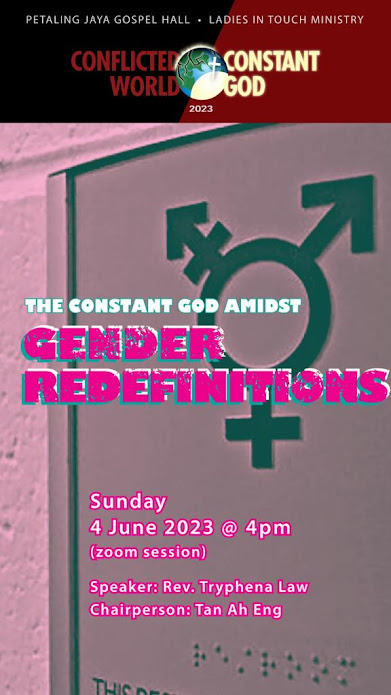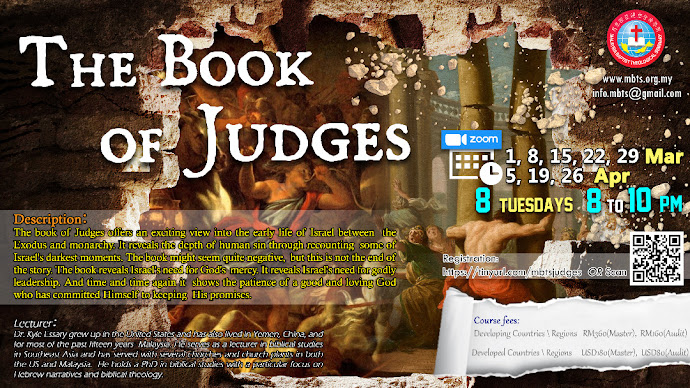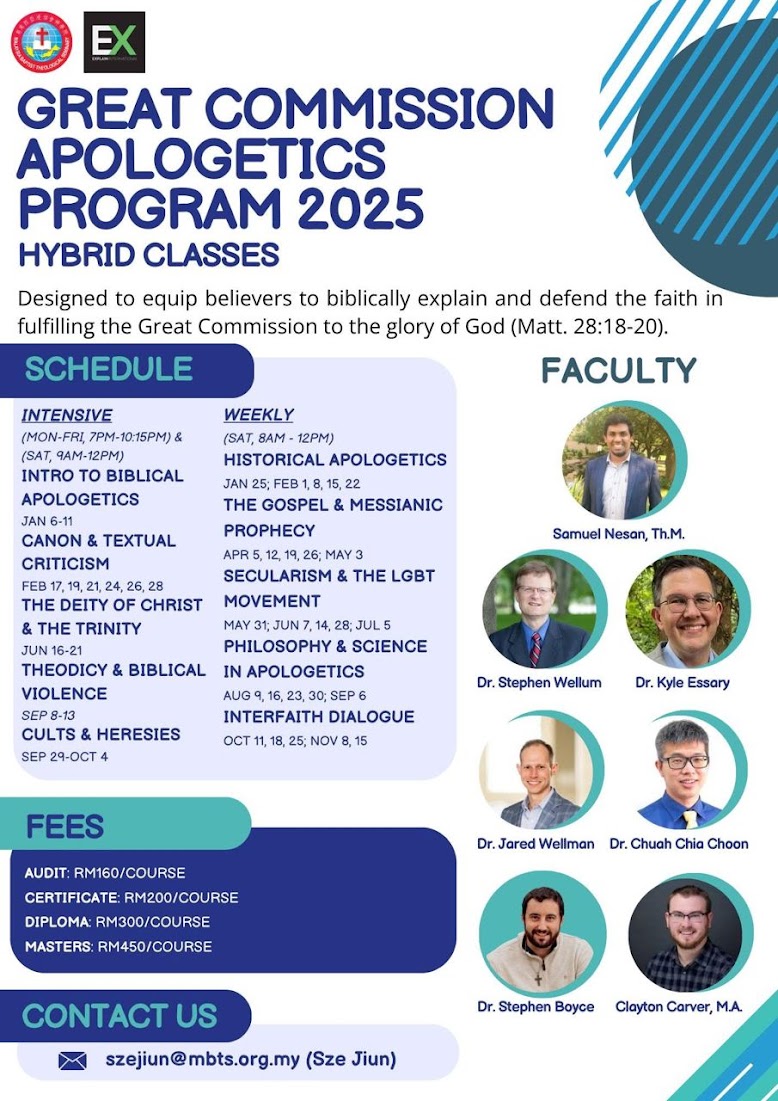Exegesis of Text from the Gospel of Mark: A Closer look at Mark 2: 23-28
By Stephen Ng
23 And it happened that He was passing through the grainfields on the
Sabbath, and His disciples began to make their way along while picking the
heads of grain. 24 The Pharisees were saying to Him, “Look, why are they doing what is
not lawful on the Sabbath?” 25 And He said to them, “Have you
never read what David did when he was in need and he and his companions became
hungry; 26 how he
entered the house of God in the time of Abiathar the high
priest, and ate the consecrated bread, which is not lawful for anyone to
eat except the priests, and he also gave it to those who were with him?” 27 Jesus said to them, “The
Sabbath was made for man, and not man for the Sabbath. 28 So the Son of Man is Lord even of the Sabbath.”
Text: Mark 2: 23-28 (NASB, Bible Gateway)
Introduction
The Decalogue was issued to guide
the nation of Israel in their pursuit of holiness. Its fourth commandment[1] highlighted the sacredness of the Sabbath
which God had instituted since the dawn of creation. It was to be set apart and
kept holy.
It is against this setting that we
now read that Jesus was
questioned by the Pharisees when He and His disciples were walking through the grainfields[2] on a Sabbath day. As they were
hungry, they plucked the heads of grain to satisfy their hunger (cf Matthew 12:
1-12). Such practice was allowed so long as a sickle was not used (Deuteronomy
23:25); however, the controversy revolved around what was prohibited on the
Sabbath based on the Pharisees’ strict observance of the regulations.
Historical
and Cultural Context
Prior to this incident, the
Pharisees were already querying why Jesus was dining with the social outcasts
like the tax collectors who were otherwise known as “sinners”. He was also
asked why His disciples were not fasting whereas the Pharisees and John’s
disciples were all fasting. It is clear from this and previous incidents that
their intention was to trap Jesus, but nothing was more serious than to allow
His disciples to profane the Sabbath[3]. After this incident, the
Pharisees also challenged Jesus about performing a healing on the Sabbath (Mark
3:1-6). Plucking the grains and healing were both permitted under the Mosaic
laws, but not on a Sabbath based on the Jewish traditions.
The theme in this passage touches
on God’s original purpose for the Sabbath, which had been “leavened” by the
Pharisees’ own interpretation of what was lawful based on the pharisaic
traditions. Over time, the original meaning of the
Sabbath was lost and what became more important to the Jewish people was the
question of what was considered lawful based on teachings that were handed down
from the intertestamental period of 400 years. The original
meaning and purpose of the Sabbath was totally lost;
instead, human
traditions overtook God’s original commandment[4]. The Shabbath
and ‘Erubin from the Jewish Mishnah detailed
every rule related to the observance of the Sabbath. There were a total of
thirty-nine specific acts that were forbidden, and reaping on Sabbath was one of
the prohibited activities (Strauss 2014,
145) .
These human teaching about God’s law soon became a burden on the people instead
of a “Sabbath of solemn rest”[5] that God had intended it to be (The Illustrated Bible Dictionary n.d., 1355) . Even before the intertestamental years, the true meaning and purpose of
the Sabbath was
already lost when it became linked with the ‘new moons’[6]. When Hosea rebuked the Israelites for
keeping the new moons, Sabbaths and other appointed feasts, he was not
condemning the Sabbath or other Mosaic institutions, but it was a divine
judgement on the new moons (The Illustrated Bible Dictionary n.d., 1355) .
However, throughout the entire
period, God had never changed His purpose for instituting the Sabbath rest. Tracing back to the times of Moses, the concept of the Sabbath was
already well understood by the Israelites even before the Ten Commandments were
given. After spending a few hundred years as slaves in Egypt, where they had to
literarily no rest, the Israelites were told to keep the Sabbath holy during
their 40 years in the wilderness (Exodus 16:22-29). The idea of the Sabbath can be traced to the creation
account, where the God of eternity divided Time into seven separate distinctive
days and nights. Man was supposed to do work for six days, and keep the Sabbath
holy by ceasing from all his work on that day. After
creating the universe and Mankind in six days, God rested on
the seventh day (Genesis 2:1-3). Therefore, Sabbath as a day of rest was not new. Although the word ‘Sabbath’ never appeared in the book of Genesis,
the manner in which God rested from all His work became the basis for the
teaching of Moses about the Sabbath throughout the entire Pentateuch. God’s intention was good. Like
all the other commandments, the “fourth commandment was given, not for the sake
of imposing religious restrictions, but to meet man’s physical and spiritual
need” (Walton, Matthews and Chavalas 2000, 858) .
Therefore, contrary to the cultural context of the day, God’s original
purpose for the Sabbath was to set aside a day when all kinds of work could
cease for both free men and slaves alike. Even the animals were supposed to be
given a day of rest on the Sabbath. It was against this historical and cultural
background that Jesus was being queried when His disciples plucked the heads of
grain, which was deemed as ‘work’ where the Jewish religious leaders were
concerned. The Pharisees had based their judgement on human traditions rather
than an understanding of the original purpose of the Sabbath.
Literary Content and Context
The Pharisees asked Jesus, “Look, why are they doing what is
not lawful on the Sabbath?” (2:24).Their main point of contention was on what
was considered unlawful on the Sabbath, rather than the actual plucking of the
grains. The word ‘lawful’ means something that is allowed or permitted by law;
in short, the question was raised whether it was acceptable for Jesus’
disciples to pluck the grains, rubbed and then ate them on a Sabbath. We learnt
from Mark that human tradition was passed on from one generation to another;
these then became rigid religious rules that the Pharisees insisted must be adhered
to strictly (Mark 7:3-4)[7].
The religious leaders during Jesus’ time measured ‘righteousness’ by
the strict compliance of the ‘precepts of men’ that unfortunately set aside the
original purpose of God’s commandment (Mark 7:7). According to Braunch, the
word ‘law’ (cf Romans 10:4) should be understood as the “religious system with
its cultic, ritualistic and moral obligations under which Israel lived its life
since Moses” (Braunch 1989, 57) . These included how the cleaning of
one’s hands and body before eating that went beyond just simple hygiene as well
as the manner in which cups and pitchers and copper pots were to be washed
(Mark 7:1-23).
In this passage, the Pharisees were already gathering evidence that
they could use so that they could put Jesus to death for profaning the Sabbath,
which could attract capital punishment. In order to execute Jesus, they had to
have enough evidence to convince the Romans and the Herodian dynasty which
ruled Israel (Boring 2006, 92) . As religious
leaders, their jurisdiction was limited to just administering discipline in the
synagogue for any breach of the Jewish law and tradition. They had to prove
that Jesus broke the laws of the Sabbath, and was therefore guilty of a sin
punishable by death.
This is where we have our problematic text here where Jesus said: “The
Sabbath was made for man, and not man for the Sabbath. So
the Son of Man is Lord even of the Sabbath” (2:27-28). To the religious leader,
it was acceptable to say that Sabbath was instituted for man, but to put Jesus
as Lord of the Sabbath was a blasphemy as that would immediately put Jesus on
par with the God of the Old Testament. Mark’s pronouncement of Jesus as the
Lord of the Sabbath was part of the purpose the book of Mark was written. The Sabbath was given for the
sake of Man; therefore, it should not restrict Man from doing what was good
(Mark 3:4) or to keep himself alive (Mark 2:23-28). The
priority was the welfare of Man (Mark 2:27) rather than the strict observance
of the oral traditions taught by men.
Jesus quoted an illustration from 1 Samuel 21: 1-6, where it was mentioned
that David had approached a certain priest, Ahimelech[8]. Jesus did not dispute whether
it was lawful for David, a non-Levite, to eat the consecrated bread, since he did
not belong to the family of Levi or the priestly family (Leviticus 24:8–9). Based
on the Levitical law, it was wrong and the Pharisees knew it. However, Jesus confounded
them asking why they did not condemn David for taking the consecrated bread;
yet, they questioned Him over a simple thing that the disciples had done out of
necessity on a Sabbath day. According to Strauss, David “did not break the
spirit and the purpose of the law, since human need supersedes mere ritual
observance” (Strauss 2014,
145) .
Elsewhere we also see that Jesus challenged the religious elites, since they
had no qualms about someone who had to untie an ox or a donkey to allow it to
quench its thirst (Luke 13:15). Then, in Luke 14:5, Jesus again asked the
religious elites: "Which one of you will have a son or an ox fall into a
well, and will not immediately pull him out on a Sabbath day?" In
answering the Pharisees’ question, Jesus rebuked the hypocrisy of the religious
leaders during His time. He pointed out that they had missed the point that the
Sabbath was created for man. By strict observance of the oral traditions
without taking into consideration the original purpose of the Sabbath, the
Pharisees had literally “made the Word of God of
none effect with their tradition” (The Illustrated Bible Dictionary n.d., 1355) .
The Broader Biblical and
Theological Context
New Wine in New Wineskin: Shortly after refuting the Pharisees on what was lawful on Sabbath
day, Jesus went ahead to perform his work of healing the man with a withered
hand. Because this took place on the Sabbath (Mark 3:1-12), it further
reinforced what Jesus had taught in Mark 2:22 about the old Judaism which emphasized
on strict ritual observance (Strauss 2014,
146) .
It is compared to the “old wineskin” that could no longer hold the “new wine”.
With the advent of Jesus, a new kingdom had dawned, where the ‘spirit (or
purpose) of the law’ gives life but the `letter of the law’ (or ‘legalism’)
produces death (2 Corinthians 3:6).
Looking at it, therefore, from
the theological perspective, although plucking and rubbing the grains on a
Sabbath was mind blowing to the old mindsets of the Jewish religious leaders,
but because of Jesus and the “new wineskin” (referring to the new kingdom), we
now have a new divine dimension and interpretation of what these laws are about.
The theology of Rest. Jesus explained that Sabbath, or its Hebrew equivalent ‘Sabbat’[9], means ‘to cease’ or ‘to
desist’ (The Illustrated Bible Dictionary n.d., 1354-6) . All living things,
slave or free, animal or humans, were supposed to cease from work on the
Sabbath. It was to be “a day of renewal”; in short, “rest for the body and
worship for the soul” was the real intended purpose – not a whole set of
religious rituals (Strauss 2014,
146) .
Hebrews 4:8-10 explained further the theology of the Sabbath rest: “For
the one who has entered His rest has himself also rested from his works,
as God did from His”. Throughout His ministry, we see that Jesus himself
knew the importance of this rest when He told His disciples to find a place
where they could find rest from the busyness of their ministry (Mark 6:30-32). He also spent His Sabbath in the synagogue
(Mark 1:21; 6:2), but He did not restrict Himself with all the minute details
of the law (on what was lawful and what was not); instead, Jesus performed His
work of healing and deliverance even on the Sabbath day (Mark 3:1-4).
Lord of Sabbath. From the Christological viewpoint, we see in Mark the pronouncement of
Jesus’ authority as the Lord of the Sabbath in hailing the advent of the
kingdom of God (Strauss 2014,
145) .
As mentioned earlier, God created the Sabbath for man, and not man for the
Sabbath; therefore, any interpretation of the fourth commandment had to take into
consideration the broader biblical and theological context. Observance of the
Sabbath does not, and should not, prohibit one from doing good or attend to the
physical needs of a person or respond to an emergency which requires work to be
done.
Isaiah
58:13-14 gives a good definition of the Sabbath: "If because of the Sabbath,
you turn your foot from doing your own pleasure on My holy
day, And call the Sabbath a delight, the holy day of the LORD honorable, And
honor it, desisting from your own ways, From seeking your own pleasure And
speaking your own word, Then you will take delight in the LORD, And I will make
you ride on the heights of the earth; And I will feed you with the heritage of
Jacob your father, For the mouth of the LORD has spoken."
Since the Sabbath was known as ‘the holy day of (belonging to) the
LORD’; therefore, Mark’s pronouncement of Jesus as Lord of the Sabbath was his
way of lifting Jesus on par with the Yahweh of the Old Testament. To the Jews, this
was a blasphemy punishable by death, but to his readers, who were mainly
Gentiles, Jesus was someone on par with the Yahweh worshipped by the Jews.
Conclusion
The cessation of one’s own pleasure and own ways, and taking delight in the Sabbath is what the Lord seeks from us. It is clearly demonstrated in the Decalogue that the Sabbath belongs to the Lord indeed; therefore, we are to set apart the Sabbath in honour of the Lord. Since the Sabbath is a special day of the Lord, therefore, the basic reason for observing it is that is a day which belongs to God
Bibliography
Beavis, Mary Ann. Paideia
Commentaries on the New Testament - Mark. Grand Rapids, MI: Baker
Academic, 2011.
Boring, Eugene M. The Commentary -
Mark. Louisville, KY: Westminster John Knox Press, 2006.
Braunch, Manfred T. Hard Sayings of
Paul . London: Hodder & Stoughton, 1989.
Keener, Craig S. The IVP Background
Commentary - New Testament. 1 vols. Downers Grove, IL: InterVarsity
Press, 1993.
Stein, Robert H. Baker Exegetical
Commentary of the New Testament - Mark. Grand Rapids, MI: Baker Academic,
2008.
Strauss, Mark L. Exegetical Commentary
on the New Testament. Edited by Clinton E. Arnold. Grand Rapids, MI:
Zondervan, 2014.
Walton, John H., Victor H. Matthews, and
Mark W. Chavalas. The IVP Bible Background Commentary: Old Testament.
Downers Grove, IL: InterVarsity Press, 2000.
Wood, Derek, ed. The Illustrated Bible
Dictionary. Vol. 3. 3 vols. Inter-Varsity Press, n.d.
[1]
“Remember the
sabbath day, to keep it holy. Six days you shall labour and do all your work,
but the seventh day is a sabbath of the Lord your God; in it you shall not do
any work, you or your son or your daughter, your male or your female servant or
your cattle or your sojourner who stays with you. For in six days the Lord made
the heavens and the earth, the sea and all that is in them, and rested on the
seventh day; therefore the LORD blessed the sabbath day and made it holy.”
(Exodus 20: 8-11)
[2]
In some translations such as the King James Version, the terms “cornfields” and
“corn” were used. They did not refer to maize, but wheat, oats, barley and
other kinds of grains.
[3]
According to Keener,
the teachers were ultimately responsible for the behaviours of their disciples.
Hence, the Pharisees were trapping Jesus when they asked about the behaviours
of His disciples (Keener 1993, 142) .
[4]
Mark 7:3-4, 9
[5]
Leviticus 16: 31
[6]
2 Kings 4:23; Amos 8:5; Isaiah 1:13; Ezekiel 46:3
[7]
The Pharisees and all the Jews do not
eat unless they carefully wash their hands, thus observing the traditions of
the elders; and when they come from the market place, they do not eat unless
they cleanse themselves; and there are many other things which they have
received in order to observe, such as the washing of cups and pitchers and
copper pots Mark 7:3-4.
[8]
Jesus mentioned the name Abiathar as
the High Priest in this passage. It was likely that David had met Ahimelech
when his son, Abiathar was the high priest.
[9]
Sabbat is a word which is derived from
the root ‘sabat’.




Comments
Post a Comment